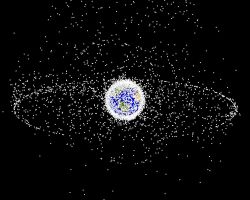Who has dibs on space debris? If getting to it were a solved problem, it sure would be fun to use dead orbital hardware as something of a hacker’s junk bin. Turns out there is some precedent for this, and regulations already in place in the international community.
To get you into the right frame of mind: it’s once again 2100 AD and hackers are living in mile-long space habitats in the Earth-Moon system. But from where do those hackers get their raw material, their hardware? The system abounds with space debris, defunct satellites from a century of technological progress. According to Earth maritime law, if space is to be treated like international waters then the right of salvage would permit them to take parts from any derelict. But is space like international waters? Or would hacking space debris result in doing hard time in the ice mines of Ceres?
Who Owns The Satellite?
There are a handful of treaties which make up the space law that governs activities in space, including ownership of satellites and other non-natural objects. The main one is commonly called the Outer Space Treaty and has been ratified by all spacefaring nations. One of the articles in it states:
ARTICLE VIII
A State Party to the Treaty on whose registry an object launched into outer space is carried shall retain jurisdiction and control over such object, and over any personnel thereof, while in outer space or on a celestial body. Ownership of objects launched into outer space, including objects landed or constructed on a celestial body, and of their component parts, is not affected by their presence in outer space or on a celestial body or by their return to the Earth.
The article is saying that satellites in space fall under the jurisdiction and control of whichever nation’s registry it was registered in. Note the wording “A State… on whose registry an object… is carried”. That registry need not belong to the country from which the object was launched. For example, SpaceX recently launched the FORMOSAT-5 satellite to LEO (low-Earth orbit). This was done for Taiwan’s National Space Organization (NSPO). If the satellite was registered in Taiwan, which is very likely the case, then Taiwan has jurisdiction and control over it.

Space Debris
What if a meteor hits the satellite and knocks off some useful bits? The above Article VIII covers this when it says “Ownership of objects launched into outer space… and of their component parts, is not affected by their presence in outer space or on a celestial body or by their return to the Earth.” That “component parts” means even if the satellite has been smashed into many separate pieces, those pieces still fall under the registered nation’s jurisdiction, no matter where those pieces are.
The Law And Space Hackers
But if you’re a hacker living in a mile-long habitat in space, do these laws apply to you? We’re talking about a distant future so the best we can do is to try to apply the present-day treaties. Another article in the Outer Space Treaty includes the following:
ARTICLE VI
The activities of non-governmental entities in outer space, including the moon and other celestial bodies, shall require authorization and continuing supervision by the appropriate State Party to the Treaty.
Let’s assume that you’re a citizen of a nation that’s ratified the treaty. In that case the “non-governmental entity” of the above article is you, and the laws of the nation you belong to apply, including the Outer Space Treaty. If taking what belongs to someone else is illegal in that nation then be prepared to face the consequences.
However, if the nation you belong to hasn’t signed the treaty, then that’s a dispute for the nations to handle. Or maybe you don’t belong to any nation, in which case it’s like the Wild West and the sheriff will be showing up shortly.
Maritime Law And Salvage
In maritime law, you’re allowed to salvage property lost at sea and are entitled to a reward. However, no such principle applies in space. As already pointed out, objects in space, even if defunct, remain the belongings of the nation that they’re registered with. But the important difference is that you’re not allowed to interfere with those objects without consent from the owners. That includes objects that would be considered space debris.
Mark Watney, Space Pirate
 A relevant situation has already come up in the popular novel and movie The Martian. Stranded on Mars during a mission, Mark Watney needs to travel 2000 miles (3200 kilometers) from the NASA habitat he’s been living in, across Mars to the Schiaparelli crater. Once there, he’ll take control of a rocket, the Ares 4, that can get him off of Mars.
A relevant situation has already come up in the popular novel and movie The Martian. Stranded on Mars during a mission, Mark Watney needs to travel 2000 miles (3200 kilometers) from the NASA habitat he’s been living in, across Mars to the Schiaparelli crater. Once there, he’ll take control of a rocket, the Ares 4, that can get him off of Mars.
He’s aware of the Outer Space Treaty but instead cites maritime law. He then points out that in crossing Mars he’ll be leaving the habitat owned by NASA to travel in international waters to commandeer the Ares 4 rocket without permission. He concludes that he therefore is a space pirate.
However, in reality there is no concept of international waters in space law. Or rather there is in the Moon Treaty, but that’s considered a failed treaty, having been ratified by only a handful of nations, none of which have space launch capabilities.
Also, Mark Watney is an American citizen travelling from one NASA owned property, the habitat, to another NASA owned property, the Ares 4 rocket. He may or may not have permission from his employer, NASA, to enter the Ares 4, but if NASA doesn’t want him to then that’s a disciplinary issue between him and his employer and doesn’t make him a pirate. And if you’re familiar with the story, that would be just one of many disciplinary issues between NASA and the free-spirited Watney.
A Word Of Caution
The original idea for this article originated from a Mars One blog entry about Mark Watney. The author, [Steven Dufresne], does not have any legal training. If you are contemplating venturing outside in search of hackable hardware from defunct satellites, seek suitable legal counsel first. Wouldn’t it be amazing if this article was looked back on in 100 years in some early legal battle over space debris salvage though?
Or you can instead remain comfortable in your berth and read about the hardware hacking that Mark Watney did during his fascinating battle to survive on Mars. Alternatively, if you’re an Earther and looking for some historical legal topics, how about the struggle for the legal right to hack your own car.
















The probability humans will ever live one day in deep space is nearing zero. Pushing the date of the prophecy to 2100 won´t make it more plausible. Wetware won´t make it, robots may.
The costs of getting “up there” would have to be near commodity status with the downside it would aggravate a lot of problems including junk (high costs and people still have a junk problem).
Even if launch price is commodity level, it’ll still be more cost effective to carry 175lbs of electronics/AI/human embryo instead of 1 person.
On the contrary. The colonisation of space is an inevitable and essential step in human evolution.
Maybe. Reminds me of a fictional story where the people stayed home and the universe came to them.
That´s a very human centric way of thinking. Evolution took millions of years. Even if we consciously accelerate the process, that will leave those “colons of space” as relevant as a frog bathing in a nuclear power plant reactor.
You´ve watched too much Hollywood movies !
evolution doesn’t work that way what you’re talking about is call manifest destiny and its a complete joke.
evolution has no goals other then best fitting the environment the animal live in at that moment. it has no forwards or backwards and shure as heck has no plan for humans to ever leave this rock.
Evolution also spends most of it’s time killing things. Us all dying long before a viable colony starts up off-planet is just as acceptable to evolution, thanks. Much moreso, actually. The Neanderthals didn’t even make it as far as metal working.
A few of them made it to work today.
Agreed it’s an absolutely necessary step for the survival of a technological civilization.
In fact I don’t see much of a future for civilization if and we could even end up going extinct in the next 100 years if we don’t.
Well, you’re half right. It’s definitely an essential step in human evolution… (At the very least it’s essential to our continued existence.) Unfortunately we’ve taken a step backwards to a time where– flip a coin –we stand as much chance of annihilating ourselves as we do of colonizing the High Frontier… So I wouldn’t call it ‘inevitable’ at the moment, no.
The article is talking about living in the Earth Moon system, not deep space.
By the time this will matter, I’m sure all the national boundaries will have been radically redrawn and the treaty signatories may no longer exist or be governed by entities that no longer recognize treaties ratified by their predecessors.
Now let us assume that space flight has advanced to the level that even small nation states, large corporations, and wealthy individuals can afford to create (accidentally or deliberately) and harvest space debris.
At that point, with no real treaties or international law in force, it will be a matter of precedent and case law. The longest standing precedent will be “law of the sea” If your satellite breaks, it’s flotsam and you still own it and its pieces. You have legal recourse to recover it. If you start throwing stuff overboard, for whatever reason, it’s jetsam and you lose ownership rights.
I never thought to look into the definition of those terms – flotsam and jetsam. That’s a really interesting bit of trivia.
It wasn’t trivia back in the day when entire coastal villages made their living forcing merchant ships onto the rocks with false lighthouse signals. Assuming you couldn’t prove the criminal action of the false signal, the question became, “Did the ‘booty’ that washed ashore qualify as flotsam because it floated away as the ship broke up or as jetsam because it was tossed overboard in an effort to reduce the draft and float off the rocks?” If they recovered your flotsam for you, you owed them a fee. If they found your jetsam, it was basically “finders keeper, losers weepers.”
And to add to your store of trivia, there are also the related legal categories of lagan and derelict.
https://en.wikipedia.org/wiki/Flotsam,_jetsam,_lagan,_and_derelict
I think, were I one of those sailors, kicking the shit out of the murderous villagers, torching the village and salting the earth, would be more likely than me paying anyone a fee. I’m sure plenty of sailors were killed by false lighthouse signals like that.
Relax, there’s no reliable historical records of deliberate “wrecking” ever taking place. You better believe the people who insured ships and cargo investigated thoroughly. It’s a persistent myth but a myth nonetheless. There was more enough genuine shipwrecks to go around in the days of sail.
The interesting thing about this reading of the treaty is liability if any of that “junk” hurts someone or damages other’s property.
It’s not ours. It’s derelict space flotsam so you can’t sue us for damages.
There’s a huge amount of unused land, and then all of the oceans, for stuff to fall into. And the atmosphere takes care of nearly all plumetting space debris anyway. I believe Skylab caused a little bit of panic in Australia when it de-orbited, but that’s one of the biggest things ever to crash in like that. Mir’s the only comparable thing I can think of, until ISS eventually comes down. Mir ended up in bits in the ocean.
Good to know ownership is retained whatever the circumstance. I shall now stop worrying about being hit on the head by a falling lump of space junk and look forward to the day it happens for a big pay out. :)
At least your heirs can look forward to a big payout!
The existing treaties sound like a pretty bad framework for salvaging space debris. I suspect that once this is common enough to be a real issue – more likely because of space junk becoming a larger hazard than because of a larger spacefaring population – we’ll see treaties renegotiated to add better provisions for handling derelict spacecraft.
Nah. It will get far past that point. Then the politicians will start taking notice. It will continue to get worse for years after that before they all finally come to an agreement.
Just leaving this here:
https://en.wikipedia.org/wiki/Planetes
https://myanimelist.net/anime/329/Planetes
Anyone who read this Hackaday article should watch Planetes! It’s a bout space debris and (in between the ridiculous comedy scenes) there is real science and you can see the author did his homework.
If life become that cheap, to the point I can leave in space, than I think we reached a point where you can be totally autonomous. Than just reject the gouvernement, become a space pirate and tadaaa no law problem anymore
So long as you are able to keep ahead of the grammar Nazis!
And what exactly will prevent said government zapping you with a nice beefy laser if you start prying their satellite open?
Their hope that Kaliin’s looting is going to cause less damage to the satellite than the laser would?
Capitol Technology University, just outside Washington D.C., has a student-led cubesat project that is capturing space junk and returning it to earth.
I just have to leave this here for consideration.
https://en.m.wikipedia.org/wiki/Salvage_1
Andy Griffith, former small town sheriff turned space pirate
I was thinking of that. He made a pretty penny from that pace junk
Michael
Damn, you beat me to it! I loved that show as a kid!
IIRC, here is the plot of every episode of Salvage 1:
Andy: I’m gonna go salvage that old military satelite! Lotsa gold parts!
Gov Guy: You can’t, it’s got secret military stuff!
Andy: Secretly launches rocket (!?) and salvages satellite.
Gov Guy: Did you secretly salvage our satellite?
Andy: Now, what would ever give you that idea?
I think eventually the law of the sea should apply as space junk could be a useful resource for early space colonists.
For example it would not take much delta V to transport a salvaged satellite from GEO to the Moon or even Mars.
It then could be recycled for the raw materials or even be refueled and repurposed as even an older comsat sitting at L2 could be useful on the Moon.
A nice side effect the Earth moon system gets cleaned up for free vs having a government entity do it.
These guys seem to have got away with it:
[From a presentation at New Scientist live 2016]
“Cosmos: How to hack a satellite
Keith Cowing
Meet the man who masterminded the hijacking of a NASA spacecraft 3 million kilometres away. In 2014, long after the ISEE-3 satellite had been written off as dead, a daring team of engineers and computer programmers decided to try bringing it back to life. Keith Cowing, editor of websites including nasawatch.com, was one of the leaders. The team succeeded against overwhelming odds in doing what NASA once thought impossible.”
They were able to wake the satellite up, but their estimates of remaining maneuvering fuel were too high. They only got one adjustment out of it so were unable to get it into the orbit they wanted.
It still was an impressive feat.
It had fuel, but none of the required nitrogen gas pressurant.
If you live in space and salvage some discarded stuff, what are owners going to do? Have you arrested?
And by time we humans actually start living in space, im pretty sure new treaties are in place and new nations born..
If humans have anything to do with it, we are never leaving this planet.